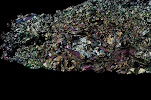Up until the arrival of social networking sites on line, the only reading I ever did (other than assignments for school work) was science fiction and fantasy novels. I happily spent much of my life with my nose buried in good book or another, enjoying the stories as they unfolds. I didn’t understand the appeal of non-fiction books, and didn’t even have interest in “literature”, as such, preferring to escape from this world by reading about life on other planets, or in other times—worlds wherein humans had risen past their baser natures and founded cooperative societies that didn’t destroy their environments. However, over the past few years I begun reading the journals my friends posted over on LiveJournal, and expanded from there to following a few well-written blogs, and using Facebook to get back into touch with various people I’ve met over the years.
One such person with whom I’ve become reacquainted was a man who graduated from the same high school I did, a few years before me. I can’t claim to have been amongst his close circle of friends, but I liked and admired the “big kids” of his generation, who were always busy—active in community involvement projects, or just having fun hanging out with one another. As a result when I heard that he’d written a book, I asked him to send me a copy.
The Fate of Nature, Rediscovering our Ability to Rescue the Earth, by Charles Wohlforth is, in many ways, completely and utterly unlike those SciFi novels I’ve so enjoyed over the years, and yet, I found myself entirely entranced by the book, reluctant to put it down each night so that I could sleep. This is a fascinating book blending science and history, full of detailed, very personal, stories about the individuals who have made a difference, both positive and negative, in Alaska over the years.
The amount of research that it must have taken to tell this story is really quite amazing. He chronicles the factors in Western culture, and their changes over time that resulted in people being willing to come into a new area (like Alaska) and remove from it such resources as they choose to, without any regard to any damage they might cause in the process, nor any plan to leave any for future generations. He cites studies that claim that the competitive nature is inherent to humans, and that given our drive for short-term personal gain there is no other option save eventual destruction of all of the ecosystems upon which we depend. But he doesn’t stop there—he cites other studies which show that again and again many humans choose cooperation and helping one another in favor of selfish gain. He shares the personal stories of the people who have worked tirelessly to save one aspect or another of the environment and how they have succeeded in their goals. He tells of the cultural changes that have taken place which result in policy changes which give him hope that it is not too late—that we, as a species may yet choose to protect and nurture our world.
Reading this book led me through a series of emotions, from depression and disgust (reading vivid details I never knew about what happened after the Exxon Valdez oil spill will do that) to uplifted sprits and joy at all that is positive in “human nature”. Reading the personal stories of the people who made it happen is fascinating. Knowing that this person, with whom I went to school when I was young, actually knows so many of these people reminds me of just how small this world is—they say that we are all connected within six degrees, but sometimes the connections are even closer than one might think.
I recommend reading this book to anyone who wants to understand more about the science (everything from global warming, to earthquake studies, to psychological studies, to biology, and more) behind living on earth, and the stories behind the facts in the history books. This book is for everyone who has ever thought “gee it would be nice if our time period isn’t one of an extinction period to rival that of the K-T boundary”.
More Translation Fun.
1 day ago




No comments:
Post a Comment